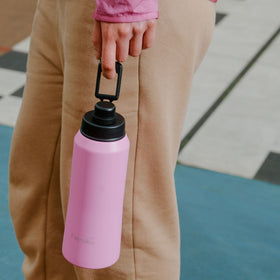
Toxic Living - Dishwasher Powders
If you're thinking about living a greener life, knowing where to start can be tricky. There's so much information that it can feel overwhelming, especially at the beginning. That's why I suggest that you make small changes to the tasks you do every single day.
Things like bringing your own reusable bags instead of choosing plastic at the supermarket, wearing a natural deodorant, and switching your laundry detergent. One of the things that we do everyday is stacking the dishwasher and switching it on. Is it worth making the change to a greener dishwashing powder? You bet.

How do dishwasher detergents work?
Dishwasher powders have to do a lot. They need to be able to get the leftover food and oils off your dishes and remove them from the dishwasher amongst all that swirling water and debris. They need to be able to clean lots of different materials at once, like glass, metal, ceramic and plastics. And they need to be able to leave your dishes without residues so that you're not dining off those residues at your next meal. So it's not surprising that dishwasher powders are a pretty complex mixture of chemicals. Dishwasher detergents are usually made up of these components:
- Surfactants or detergents for mixing oils and fats with water
- Alkalis to emulsify grease and alter the pH of the water to the right level for effective cleaning
- Bleaches for removing the appearance of stains by oxidising coloured substances to colourless ones
- Biosubstances, or enzymes, which are used to break down starch and protein based dirt (the leftover food)
- Builders (or water softeners) that bind to minerals in the water, rather than to the surfactants that remove the oils
- Auxiliaries which can include things colours and fragrances, as well as chemicals that clump together to form the tablet, or not clump so that the powder flows freely
What's the problem with dishwasher powders?
The problem with dishwasher powders is that some of the ingredients used are not the greatest for the environment. As always, manufacturers want the product to work well, but they need to make money, so many choose the lowest cost ingredients that will do the job, in order to maximise profits.

Here's some of the problem ingredients:
Surfactants
Oil and water don't mix. That's where surfactants come in. They help to dissolve the oil particles in the water, so that the oils can be lifted from the dishes and washed away. Surfactants are the detergent or foaming, part of the dishwashing powder, so they're pretty important.
A large recent study shows that the surfactants themselves don't seem to be an environmental issue. However, many of the surfactants used in dishwash powders are contaminated with 1,4 dioxane.
1,4 Dioxane is a byproduct of the ethoxylation process which is used to turn alcohols and phenols into surfactants. Although it can be removed, it often isn't. Sodium Laureth Sulfate is just one of the surfactants that can be contaminated by with 1,4 dioxane.
1,4 Dioxane is considered to be a likely human carcinogen. It can be easily removed from products, but often isn't, so we end up flushing it into the water system, where it contaminates both soil and groundwater, and ends up in our drinking water.
Builders
Phosphates are often used as builders in dishwashing powders. There are minerals in our water, and these minerals prevent the detergents from working properly. If you've ever showered in a hard water area, you'll notice that your shampoo and soap doesn't lather up very well. This is because of the minerals in the water source.
Obviously, it's important that the detergents work properly to remove the grease and food remains from your dishes, so manufacturers include builders. Where phosphates are used as builders, they end up in our waterways.
This leads to what is called eutrophication, where there are so many nutrients (nitrates and phosphates) in the water that the algae grows so much that it reduces the oxygen in the water, causing all sorts of problems for marine life.
Bleaches
Many dishwasher powders also contain sodium hypochlorite as a bleach. If you drink black tea, you may have noticed that the tannins stain the inside of your cups. Bleaches are used to remove these kinds of stains.
Sodium hypochlorite is a chlorine based bleach, and chlorine is known for being an irritant, for causing asthma and is of course, toxic to aquatic life, which is why we use it in swimming pools.
Colours and Dyes
Colours are used in dishwash detergents to make the product look pretty, but also as a 'bluing' agent. Blue colours look cleaner and brighter than yellow ones.
Dyes don't make any difference to the effectiveness of the cleaning product, but they can be contaminated with heavy metals like cadmium, lead and arsenic. They can then be ingested because of the residues left on your dishes.
Fragrances
Fragrances are used to hide the smells of your dishes and food waste caught in the dishwasher filter, as well as to cover the smell of the other ingredients in the product. Synthetic fragrances can contain parabens, phthalates and other irritants and allergens.
How to buy safer dishwasher detergents
The good news is that there are greener products available that work really well in your dishwasher. I've used Ecostore for years, and love it. Cleaning products don't have to disclose their ingredients, so it can seem difficult to know which ones are actually greener. As always, ignore the marketing claims on the front of the packaging, and look for:- chlorine free
- phosphate free
- biodegradable
- grey water safe
Look for independent eco certifications. Ecostore has the New Zealand Enviro-Mark Diamond credentials. It's expensive for companies to get certified, so if they're not, don't give up on them.
Look for companies that fully disclose their ingredients, like Abode, Ecostore, and Kin Kin Naturals.










